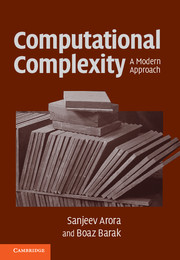Book contents
- Frontmatter
- Contents
- About this book
- Acknowledgments
- Introduction
- 0 Notational conventions
- PART ONE BASIC COMPLEXITY CLASSES
- 1 The computational model – and why it doesn't matter
- 2 NP and NP completeness
- 3 Diagonalization
- 4 Space complexity
- 5 The polynomial hierarchy and alternations
- 6 Boolean circuits
- 7 Randomized computation
- 8 Interactive proofs
- 9 Cryptography
- 10 Quantum computation
- 11 PCP theorem and hardness of approximation: An introduction
- PART TWO LOWER BOUNDS FOR CONCRETE COMPUTATIONAL MODELS
- PART THREE ADVANCED TOPICS
- Appendix: Mathematical background
- Hints and selected exercises
- Main theorems and definitions
- Bibliography
- Index
- Complexity class index
2 - NP and NP completeness
from PART ONE - BASIC COMPLEXITY CLASSES
Published online by Cambridge University Press: 05 June 2012
- Frontmatter
- Contents
- About this book
- Acknowledgments
- Introduction
- 0 Notational conventions
- PART ONE BASIC COMPLEXITY CLASSES
- 1 The computational model – and why it doesn't matter
- 2 NP and NP completeness
- 3 Diagonalization
- 4 Space complexity
- 5 The polynomial hierarchy and alternations
- 6 Boolean circuits
- 7 Randomized computation
- 8 Interactive proofs
- 9 Cryptography
- 10 Quantum computation
- 11 PCP theorem and hardness of approximation: An introduction
- PART TWO LOWER BOUNDS FOR CONCRETE COMPUTATIONAL MODELS
- PART THREE ADVANCED TOPICS
- Appendix: Mathematical background
- Hints and selected exercises
- Main theorems and definitions
- Bibliography
- Index
- Complexity class index
Summary
[if φ(n) ≈ Kn2] then this would have consequences of the greatest magnitude. That is to say, it would clearly indicate that, despite the unsolvability of the [Hilbert] Entscheidungsproblem, the mental effort of the mathematician in the case of the yes-or-no questions would be completely replaced by machines. … [this] seems to me, however, within the realm of possibility.
– Kurt Gödel in a letter to John von Neumann, 1956I conjecture that there is no good algorithm for the traveling salesman problem. My reasons are the same as for any mathematical conjecture: (1) It is a legitimate mathematical possibility, and (2) I do not know.
– Jack Edmonds, 1966In this paper we give theorems that suggest, but do not imply, that these problems, as well as many others, will remain intractable perpetually.
– Richard Karp, 1972If you have ever attempted a crossword puzzle, you know that it is much harder to solve it from scratch than to verify a solution provided by someone else. Likewise, solving a math homework problem by yourself is usually much harder than reading and understanding a solution provided by your instructor. The usual explanation for this difference of effort is that finding a solution to a crossword puzzle, or a math problem, requires creative effort. Verifying a solution is much easier since somebody else has already done the creative part.
- Type
- Chapter
- Information
- Computational ComplexityA Modern Approach, pp. 38 - 67Publisher: Cambridge University PressPrint publication year: 2009



